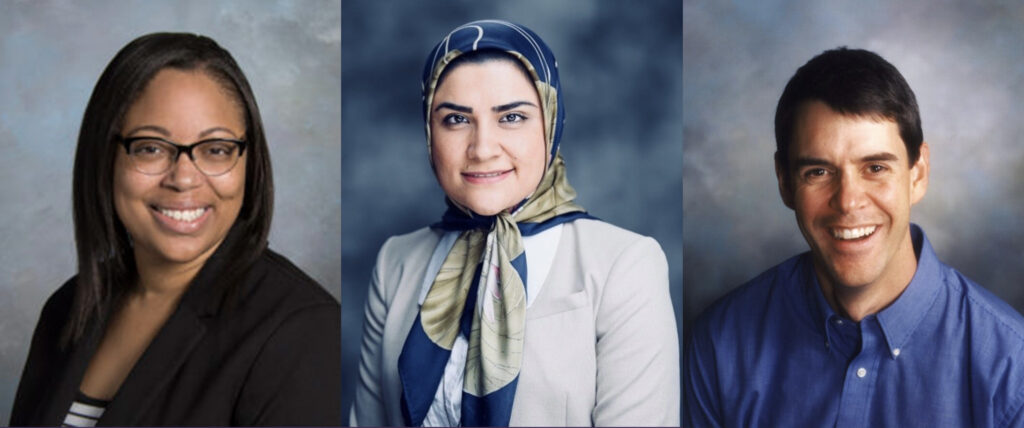Goldman, Fallah and Davies receive VIVA Open Grants for greater resource accessibility and innovative class design
3 min read
Adria Goldman, Samira Fallah and Stephen Davis received VIVA Grants to provide open and affordable educational resources to their students in light of the high cost of university education. | UMW Voice
by IRENE CASTELLET
Staff Writer
“I didn’t want my students to pay for something that at the end of the day they may not be required to use entirely, so I saw the announcement for the [VIVA Open Grant] and I felt like, ‘Okay, this is a good incentive to just push me towards using an open education resource,’” said Samira Fallah, an assistant professor in the College of Business.
Fallah is one of three recipients at UMW to receive a VIVA grant, which Virginia’s Academic Library Consortium established to “encourage the use of open and affordable course content by providing funding for instructors and libraries to adopt, adapt and create course content that can be made available to students for no or very little cost.”
Computer science professor Stephen Davies and communication and digital studies associate professor Adria Goldman also received VIVA grants, all of which aim to alleviate the financial burden on students by providing free access to costly course materials.
Faculty members received an email about applying for a VIVA grant, “which was asking us to adopt some free online resource for students,” said Goldman. Applicants had to identify a particular source they wanted funding to use and explain its relevancy to their course.
According to UMW Voice, the VIVA Open Adopt Grant program offers assistance to educators by incorporating pre-existing open or low-cost materials into their syllabi, thereby ensuring accessibility to academic resources for Virginia educators.
With this grant, Fallah will be able to incorporate “OpenStax Principles of Management” in her Principles of Management course. Davies will adopt the second edition of “Database Design” for his Applications of Databases class, and Goldman will integrate “Communication in the Real World” in Introduction to Communication and Rhetoric.
Together, the professors’ three initiatives are projected to save students over $72,000 in textbook expenses and impact over 1,000 students over five years. Statewide, the 2023 awards are expected to save students nearly $1.5 million in expenses and have the potential to benefit over 16,000 students.
With the reduction of textbook costs, instructors have more flexibility when it comes to organizing their classes and offering their students a low-cost but high-quality education.
Anna Vilain, a sophomore communication and digital studies major and exchange student from France, said that this grant “opens frontiers to other very interesting options.”
“I think it’s an excellent idea that many people could benefit from,” she said. “Also, it means that learning does not come only from a textbook, which can be a bit boring.”
Fallah explained that using a cost-free textbook allows her to use funds to incorporate other tech resources in her classes.
“In terms of assignments, first of all, there are many interesting simulations out there, and there are new simulations that are not being used much by instructors—they are AI-based simulations,” she said.
In these simulations, students log into a game, which then provides them with a case scenario within a certain field. In simulations on managerial decision-making, students practice skills like “how to manage remote work, or how to be a more effective manager or how to develop a specific type of a strategy,” according to Fallah.
To Fallah, implementing alternative academic resources is not only about their affordability but also their impact on pedagogical approaches.
“These simulations are, unfortunately not free, so students need to pay, but the payment that they need to make is much lower than the textbook. So, now that I don’t use a textbook, I may be able to use those simulations,” said Fallah. “Other than these, I can be creative in terms of coming up with new assignments, and I design new activities.”
For both students and teachers, this grant marks a new stage in the way classes are taught at UMW.
“I think there’s a move towards getting free information online, right—whether it’s credible or not—it’s there, and I think we have to kind of tap into that,” said Goldman. “By locating or even creating these free credible resources for students, I think it does have the potential to have a big impact on higher education because it’s expensive.”
Building on Goldman’s insight, Fallah expressed enthusiasm for the potential benefits this shift could bring to the future.
“I’m excited for my students, and hopefully this will make me a better instructor … [and] help my students learn better,” said Fallah.










